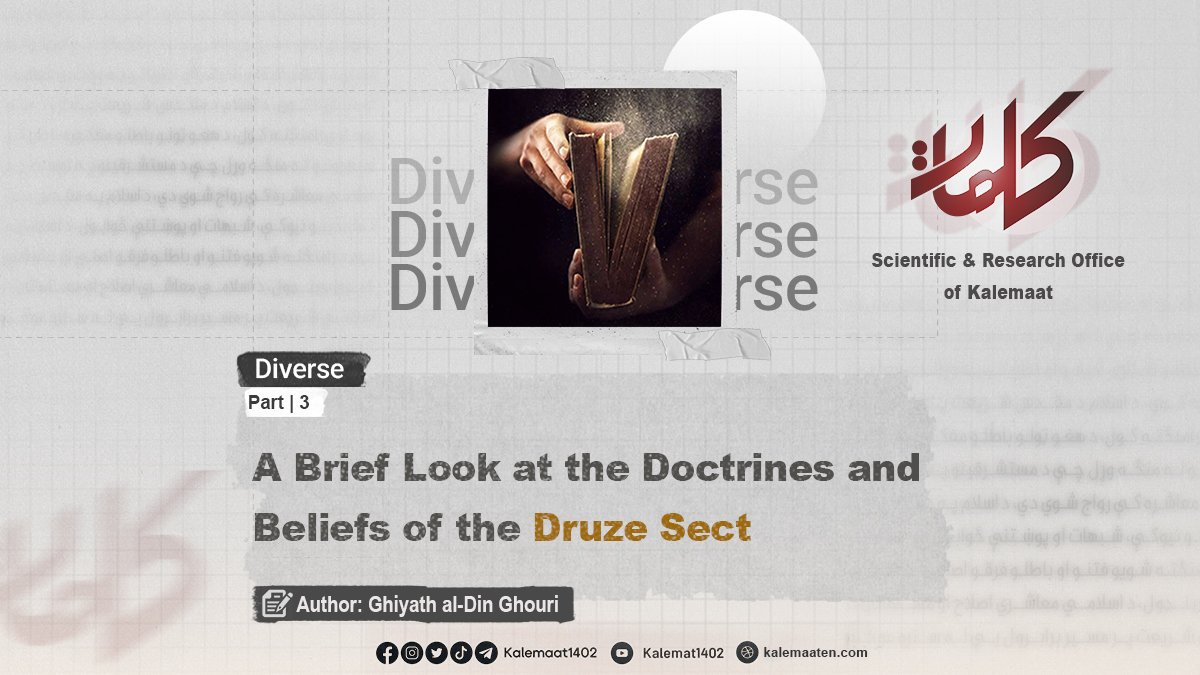
Author: Ghiyath al-Din Ghouri
A Brief Look at the Doctrines and Beliefs of the Druze Sect (part three)
Who are the Druze?
They lived in the midst of Islamic society and in Muslim states; at the same time, they pretend to be close to the Christians because in their eyes, the “Christ” is Hamza ibn Ali.
Even now, in the lands of Zionism (Israel), they pretend to be close and friendly with the Jews, and we have seen that some of their great and contemporary thinkers travel to India and declare that their belief originated from Indian wisdom.
But the truth is that deep down, they hate all followers of other religions – especially Muslims. They believe that the devils are followers of other religions and that the «عقال» Oqq’al (wise) are the angels.
Throughout history, this sect has tried to present itself as an independent and sometimes Islamic religion, with various disguises and hidden and open beliefs, while the basis of their beliefs is derived from extreme esotericism, reincarnation, and the ruling divinity of Allah.
The Druze, who call themselves «موحدون» “Mowahedoun” or believers in monotheism, and are also called «بنی معروف» “Bani Ma’ruf,” and have derived most of their beliefs from the Ismaili sect, are said to have taken the name Druze from «نشتکین دروزی» “Noshtakin Druze,” the same person who separated from the Fatimid caliphs of Egypt and went to Syria to spread his call there.
Their beliefs are a mixture of various religions and thoughts, and they believe in the secrecy of their beliefs. They do not reveal these beliefs to the public, nor do they even teach them to their children, unless they reach the age of forty. [1]
The Druze believe that God (Allah) is the one and only eternal ruler of the world, that He is pure and beyond the description of His servants; because, according to them, the human mind is unable to comprehend the greatness of God’s attributes.
Some sources say that this tribe separated from the Ismaili sect during the Fatimid Caliphate in the 10th century AD; but some scholars consider it an independent belief in itself.
The Druze are considered one of the oldest societies in the Middle East.
No one can convert to this religion and those who leave their religion can never return, and marriage with a non-Druze is prohibited.
They have sacred texts; but access to them is limited and only a small number of Druze are allowed to participate in religious ceremonies.
They do not share the details of their religious beliefs or practices, for this reason, they are often seen as a secret society. They are considered Arab Culturally, linguistically, and ethnically; But most Druze consider themselves Druze first and Arab second.
The Druze have a class of religious men known as «عقال» “Oqq’al” and their leader is called «شیخ عقل» “Sheikh Aql”. They prefer to marry members of their own tribe and their marriage is based on the consent and agreement of the parties, while preserving the rights of both parties and equality between them. Polygamy is prohibited in this tribe and the basis of marriage is transparency and openness; therefore, the parties must state their physical, mental and spiritual health status. The right to divorce is not only available to men, but women can also separate from their husbands.
The Druze religion is one of the main religious groups in the Levant and has between 800,000 to one million followers. They live mainly in Lebanon, Syria and Israel, with smaller communities in Jordan. The Druze constitute 5.5% of the population of Lebanon, 3% of Syria and 1.6% of Israel. The oldest and most populous Druze communities are located in Mount Lebanon and southern Syria, around the «جبلالدروز» “Jabal Druze” (literally “Druze Mountain”). The Druze community has played a significant role in shaping the history of the Levant and continues to play a significant political role.
Their long-standing theory has been that the Druze originated from twelve Arab tribes that migrated to the Levant before and during the Islamic period. This view is accepted by all Druze communities in Syria and Lebanon and by most Druze in Israel.
Continues…
Previous Part / Next Part
References:
-
The Simplified Encyclopedia of Contemporary Religions, Sects, and Parties: 397


